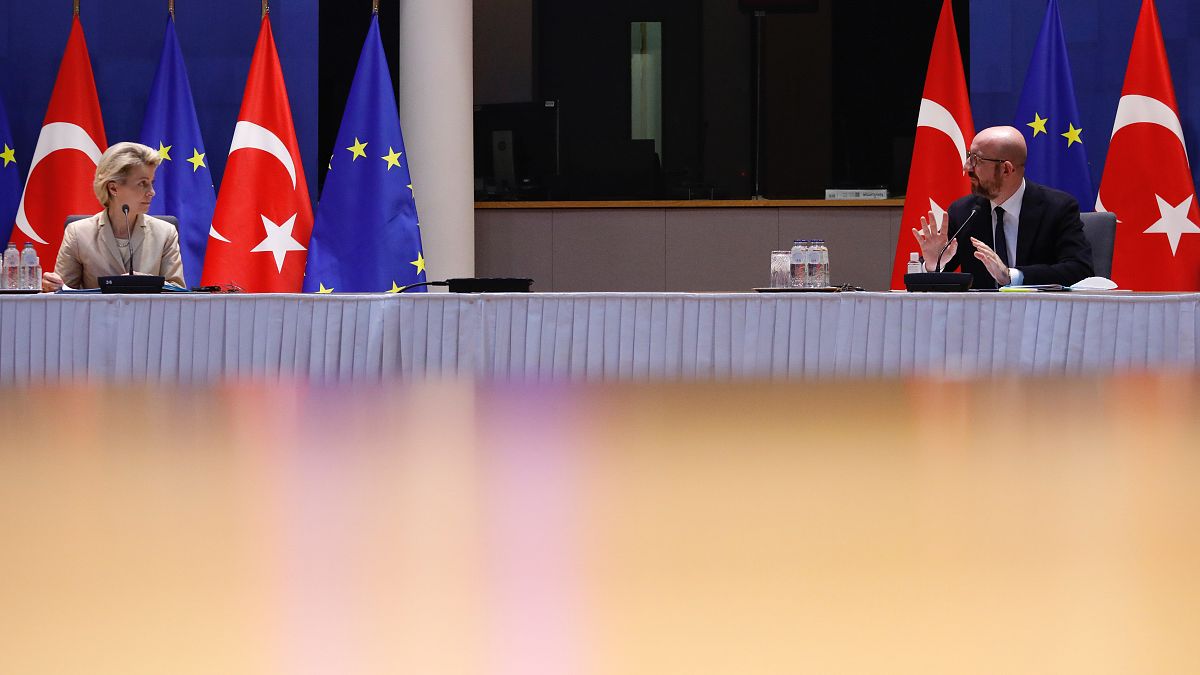European leaders will meet next week in Brussels to discuss the state of EU-Turkey relations following a fractious 2020.
The European Union is looking to reset relations with Turkey by offering a review of the migration deal that will likely include a fresh injection of EU money.
The deal, which was signed in 2016 to help Turkey host refugees coming mostly from Syria, expired at the end of December, with the final eight contracts worth €780 million. The total value of the agreement is estimated to be €6 billion.
The news follows a videoconference of European Commission President Ursula von der Leyen and European Council President Charles Michel with Turkish President Erdoğan on Friday afternoon.
EU leaders will meet next week in Brussels to discuss the state of the EU-Turkey relations. Josep Borrell, the EU's chief diplomat, will submit a report ahead of the encounter, tacking a wide host of issues that have exacerbated tensions between the two neighbours.
EU-Turkey relations hit a new low in 2020. The tumultuous year saw President Erdoğan expand illegal drilling explorations in the Eastern Mediterranean, encourage migrants and refugees to cross the Greek border and lead an international boycott against French President Emmanuel Macron.
Borrell's report will address these topics through a positive and a negative agenda. On the positive side, there will be the possibility of refinancing the migration deal, Euronews has learned. Turkey currently hosts over 4 million refugees, which no member state is looking forward to receiving any time soon.
The modernisation of the customs union, dating back to 1995, and a liberalisation of visa requirements for Turkish citizens will also be part of the incentives for dialogue and cooperation.
The negative agenda will be based on the threat of EU sanctions as a response to the Turkish naval activities in the Eastern Mediterranean, which last summer triggered a full-out diplomatic crisis with Athens and Nicosia. Borrell has already compiled a list of potential targets to use as an instrument of deterrence.
Concerns related to human rights and the pro-Kurdish party HDP will also be on the leaders' radar. The Peoples’ Democratic Party (HDP), the third-largest party in the parliament, is on the brink of being outlawed after a top prosecutor filed a case with the constitutional court over its alleged ties to the Kurdistan Workers Party (PKK) militant group.
Hişyar Özsoy, the foreign affairs spokesperson for the HDP, told Euronews that the EU should not have a good relationship with Erdogan's government at any cost.
"Tens of millions of people in this country are fighting for a democratic future and now we see European leaders, for what reason we don't know, they are kind of giving Erdogan some fresh air," Özsoy explained.
"How do you expect people would interpret this in Turkey? I mean, I am a representative of the Democratic Party. More than 5000 colleagues of mine are in prison. Why we are doing this and what is the benefit? We are fighting for the democratic future of Turkey. We do think that Turkey and the EU should have a good relationship, but not a Turkey that is ruled under almost a dictatorship."
Following next week's meeting, EU leaders are expected to give the European Commission a clear mandate to pursue the dual agenda and deepen negotiations to refinance the migration deal. The EU intends to present the occasion as a win-win for Ankara. Presidents von der Leyen and Michel are considering a visit to Turkey after the March summit.
'We still have the same problems'
EU-Turkey relations are one of the most important, complex and volatile elements of the bloc's foreign policy. To this day, Turkey remains an official candidate to join the EU, although this process has been effectively frozen for years and has been overtly criticised by several heads of government. The EU is Turkey’s number one import and export partner, as well as source of investments.
Compounding the problem is Turkey's membership of NATO, which makes it a military ally of most EU countries. According to NATO's principle of collective defence, Turkey would be bound to assist the EU in case of a military attack - and vice versa.
However, Turkey's incursions in the Eastern Mediterranean, northern Africa and Syria are often described as provocations against the interests of other NATO members, like Greece and France.
The strategic partnership with the EU weighs heavily on Ankara. In a bid to diffuse tensions and repair relations with the bloc, the government of President Erdoğan launched a charm offensive at the beginning of this year.
"2020 was a problematic year in terms of bilateral relations between Turkey and the EU," Mevlüt Çavuşoğlu, the Turkish Foreign Minister, said in January after meeting with Josep Borrell in Brussels. "Since then, both sides expressed the will in order to create a positive atmosphere for the development of ties between the two sides."
But experts warn that, behind this façade of appeasement and reconciliation, there lie many deep-rooted problems that can limit the benefits of a diplomatic reset.
"The posture of Turkey today since the beginning of the year is tactical simply because of what happened last summer led Turkey to no progress at all on a number of subjects. They want to progress," Marc Pierini, a visiting scholar at Carnegie Europe with a focus on the Middle East and Turkey, tells Euronews.
"Toning down the narrative is, of course, something useful. But that's just the choreography. In substance, we still have the same problems. The economy is going bad, the opinion polls are bad."
"What you see now is an all-out offensive on opponents, not just [on] civil society and journalists, as we've seen before, but now on Kurdish deputies and on the Kurdish party as a whole," Pierini explains, adding that, despite the overtures for dialogue, "everything else which is done on the ground goes in the exact opposite direction".
----
Watch Darren McCaffrey's analysis of talks between EU and Turkish president Erdogan in the player above.
